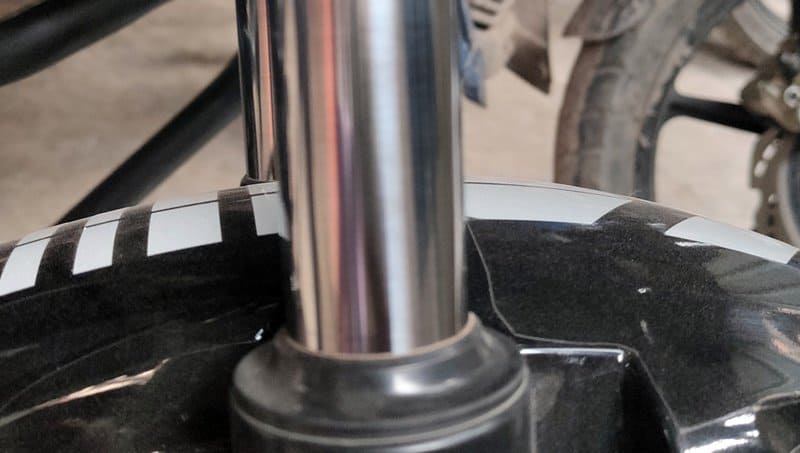Fork oil lubricates a motorcycle’s fork tube to reduce corrosion and wear. Besides this, it helps with the friction and heat produced by the movement of the tubes.
Every motorcycle needs its fork oil changed eventually. Depending on your riding style, you may have a few options to choose fork oil for motorcycles. Do you need lighter oil or heavy oil? From so many options there are many considerations.
You should consider the fork oil performance, your preferences, and the oil brand you purchase. However, with a little research, you can easily find the proper oil for your motorcycle.
What Fork Oil Does?
The fork is an important component of your motorcycle’s ride quality. Inside each fork is a valve that handles fork compression and rebound. Two movements are involved: in and out or going up and down.
Inside the fork, oil operates directly with the valves to offer compatible damping when you ride. The oil inside the fork works directly with the valves to provide consistent damping as you ride.
It controls the power of the fork and converts it into heat that the fork absorbs oil. Additionally, it does this regardless of terrain, temperature, or what type of motorcycle you want to ride. The work is the same.
How To Choose Fork Oil For Motorcycles?
Here are some points you should consider, before purchasing a fork oil.
Fork Oil Viscosity
When you are talking about fork oil, density is one of the most important factors to consider. The oil density will generally determine how well your fork performs and how comfortable your ride is.
Fork oil thickness is a measure of viscosity or how resistant it is to fluid flow. If fork oil viscosity is higher, the fork oil flows slowly. So, if the viscosity is higher, the damp you get. It takes additional force to get fork oil through the fork valve holes.
In addition, the opposite of low viscosity is fork oil. Generally, this is a thinner liquid that travels freely through the valve. As a result, it produces less damping force.
Fork Oil Weight
Accordingly, you have seen the numbers like motorcycle fork oil 20w, 5w-30, and 10w-40 on motor oil containers. Mainly, you may wonder what they meant. Well, these numbers indicate that weight means how thin or thick the oil is. The first number indicates winter weight and the second number indicates summer weight.
Fork oil weight and viscosity don’t always line up. With many different viscosities, you can end up of the same weight and even high viscosities at low weights. For example, a 5W or 7W fork oil may be thicker than a 10W or 15W fork oil. That’s why choosing the right one can be more difficult.
What you need to look for is the viscosity index. It’s because it offers a measure of how consistent the oil’s viscosity is across a temperature range. Normally, the higher the number, the more compatible the oil.
Fork Oil Brand
Before purchasing a fork oil, consider the brand is very important. You can find different brands on the market, each with its formula. Some brands provide better products than others. For that reason, it’s best to do some research to find the right one for your motorcycle.
Read Also: Does Oil Brand Matter?
Once you have considered all of these factors, you should be able to narrow down your choices and find the perfect motorcycle fork oil for your bike.
How Often Do I Change My Fork Oil?
This question is difficult to answer with a simple number of miles or usage time. Ultimately, if you’re looking for a lot of miles, 5,000 seems to be a common number adopted by riders. Regarding timing, you may find that fork oil should be changed every two years. It depends on how often you ride the bike.
Miles may be a good substitute for tracking maintenance on your road-riding motorcycle. But the time of use may be better for your off-road component that doesn’t use an odometer and speedometer.
How you determine the frequency of changing your fork oil will be up to you. But in either case, you should experience a significant change in oil performance towards the end of its life.

What Did We Use As Motorcycle Fork Oil Substitutes?
Most people have heard of ATF( automatic transmission fluid), and hydraulic fluid. And you may think you will use them as Fork oil substitutes. But are they compatible to use as a fork oil substitute? So, before using them let’s see what is the truth.
Hydraulic Oil
Hydraulic oil is formulated to carry heavy loads and run slowly due to its high viscosity. Primarily, It is best for its (construction machinery) high foam resistance, compressibility, oxidation stability, thermal stability, etc. Due to its viscous characteristics, it is not optimal for fast and rapid forks.
ATF (Automatic Transmission Fluid)
ATF is the best torque converter that offers lubricant for torque converter equipment like the turbine, and clutch assembly. And it is mainly used in four-wheeled vehicles (such as cars, trucks, etc.). Ergo it’s not a safe bet to use on our motorcycles.
The fork oil provides smooth compression and retraction of the fork piston to avoid rapid heating. Therefore, it’s especially used for the lubrication of motorcycle forks, suspension struts, shock absorbers, and other spring components.
Overall, avoid using any other substitute for your motorcycle forks. Check your user manual and be aware of your surroundings when choosing your fork oil.
Dirt Bike Fork Oil:
Properly setting up and maintaining the front fork of your dirt bike is one of the most important parts. To ensure your bike handles and performs as it was designed to.
Proper fork oil weight on your dirt bike fork helps reduce the incidence of bottoming out from big hits. Your front wheel behaves like it’s going over the rest of the obstacles on a motocross track.
Much like your motorcycle’s engine oil, your forks require proper fork oil and oil levels. To keep things fresh, you should change this oil frequently. That’s where any similarities to motor oil are at the end because Fork oil is a special type of oil.

FAQ(Frequently Asked Questions):
Q. Why Does My Motorcycle Fork Oil Leak?
Fork oil seal leaks can occur from simple age, debris, wear and tear. Chrome imperfections and nicks can also cause your fork seals to leak. Nonetheless, most of the time your fork seals are leaking because open seals there are leaving debris and allow the fork oil to leak out.
Q. What weight is motorcycle fork oil?
The weight of Fork oil ranges from 5 to 50 weight. Why such a broad range and what are the differences? When you hit a bump in the road with lower-weight fork oil you will feel more top out. Likewise, this shock returns to its original position.
Q. Does it matter what fork oil I use?
Yes, because fluid viscosity affects how slow or fast the oil flows through the shock valve. If you like an as faster rebound, use light Fork oil. On the other hand, if you like a slower rebound, use a heavier Fork oil.
Q. Is motorcycle fork oil the Same as engine oil?
Motorcycle Fork oil and engine oil differently measure their viscosity. 5wt Fork oil will not be the same as 5wt engine oil. The reason is that engine oil will have another wt such as 40wt. Therefore, it runs from cold to wt.
Final Word
Motorcycle fork oil is something maximum dirt bikers and motorcycle racers are intimately familiar with. Replacing oil on their forks is like a religious ritual. Because they understand that it has a big impact on the performance of the motorcycle.
It also affects the health of the front suspension. Many road bike riders don’t know what fork oil is. Many motorcyclists don’t know that this is a maintenance task. And you should be done depending on the number of miles you do and the type of riding you do.
This is not indicated in most bike manuals. Finally, we want to say we are trying to give proper information about oil for motorcycles here. We hope you get the point that you want to know.
RELATED:

